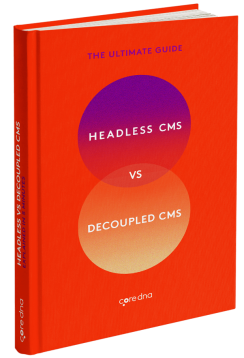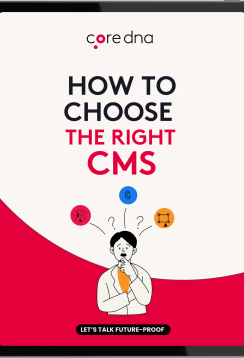Tools for choosing the right CMS

Making the right choice in CMS platform for your business is harder than you think. In fact, choosing a new content management platform for your web assets has never been so hard. The wrong decision in this case can have a lasting impact on your digital initiative for years and cost considerable cash and time to rectify.
Here are 10 key points for a buyer to consider when making the right CMS platform decision.

1. It’s about more than just the features
You will notice that many providers promote the features of their platforms as the main differentiator. In today’s world of rapid innovation, emerging features seem to eventually find their way into all products. The features however are only useful if you can implement them into your business. They need to be communicated in terms of specific business outcomes. Ensure that your provider is committed to ongoing innovation and has a development roadmap. Consistent communications about upgrades and more importantly security fixes should be part of the regular communication process.
2. Where’s the Support?
One of the biggest complexities of the open source community is the support paradigm (or lack of). If you do though have in-house developers than an open source platform may make sense, however this can implode into an inefficient and fiscally draining solution. Having limited technical know-how means that the developers rely on providers who are under resourced or take no responsibility past the build phase of a project.
Support comes in many forms, and the reassurance of having someone you can contact to resolve an issue quickly is essential. If your digital assets are critical, the ability to establish service level agreements (SLA) between you and your platform supplier provides the reassurance you’ll need from the platform.
3. How will it work with other Systems?
The world of software as a service has created best-of-breed products that are interconnected well. If your content management platform is restricted from its ability to connect with other systems then you limit your ability to take advantage of other niche solutions to help you achieve your business goals. It should be able to integrate with marketing technology with ease, like analytics, email marketing and other tools that are part of the brand ecosystem.

4. What about Search Engines?
Your content may be important to how your website ranks in search engines, however you will need the flexibility to control the search engine optimisation within your platform. No matter how well your content management platform performs or what functionality it delivers for your business if you are not well placed on search engines you might as well save your money.
5. Do I need to modify the System Code?
Although platforms today should be “open” for external integration- there shouldn’t really be a need for you to have to change the code yourself. However, should there be the ability to control the display later? Most definitely yes. In the future, the system code of content management platforms will be upgraded by professionals without the need of the end user to do anything. The paradigm of upgrading your platform will be a thing of the past, new features will become available for use as they are developed and the need to “rebuild” or “upgrade” will be gone.

Headless vs Decoupled CMS Architecture
Do you know the difference between a headless and decoupled CMS? Learn everything you need to know before making your next content management system decision.
6. How does ongoing Innovation help?
One thing that has been constant about the IT industry throughout the years has been the rate of change. The same applies to your content management platform, the rate of change of the internet is moving much faster now, so the concept of set and forget has withered away. You need to be able to see the innovation happening and not be required to make major upgrades to implement the changes. Innovation should happen regularly and in small increments, so that you can trial the updates and use them if the requirement is there.
7. Someone else takes care of the Hosting
A content management platform is useless without the right hosting platform to support the application. Predicting the traffic flows is nearly impossible; the difficulty isn’t the average traffic flows rather the spikes that come from short bursts of campaigns like newsletters or special offers. Ensure that your content management platform has supported Infrastructure providers that take care of the networks, hardware provisioning and the patch management for that infrastructure. Increasingly hosting will need to ‘auto scale’, be intelligent enough to grow the hardware resources as demands change and then reduce as the demand drops off.
8. What does Security really mean?

Cyber security is a major growth area for platform providers. Ensuring that your system is protected from various forms of hacking is an essential requirement. Insist on proof of penetration testing and security policies. The quickest way to destroy your brand in the online space is for your site to be hacked or defamed. Security processes are ongoing and need to be undertaken regularly to ensure your platform is vigilant against the ongoing threats of cyber-attack.
9. How does the Ecosystem help me?
Just creating a platform with some software or service isn’t enough in the demanding web world. Today’s platforms require comprehensive training tools to educate your community, ideas sections for the community to share new ideas and make suggestions to developers. News groups promote collaboration, whilst Analytics tools provide the insights into the platform’s performance. Alert systems inform the community of any failures or issues as they arise in real-time making it easy for administrators to take action. These are just some of the elements of what we call a platform ecosystem.
10. Can it really help with Online Engagement?
Establishing active engagement with your target community requires you and the platform you choose to have the capacity to monitor both online and offline behaviours. Using these behaviours to your advantage, you can provide a personalised experience that is relevant to the visitor and their needs. When it comes to publishing content you now need ways to share the content to the right channels to go where the community resides. When the visitor engages with your platform knowing their name and personal details won’t be enough, knowing their online value is now becoming an important factor in not only reaching them but also the community around them.
You can see from the above that there are many factors in selecting a content management platform that go far beyond a technical language or a database. In the future your platform will undoubtedly be organic in nature and transform as your business needs change.

Guide: How to Choose the Right CMS: The Definitive Guide
The only guide you need to choosing the right CMS platform to help drive business growth.













